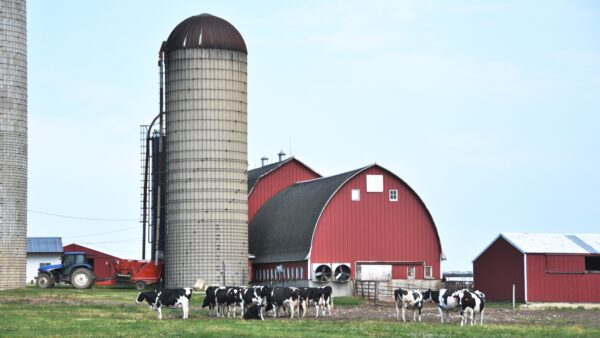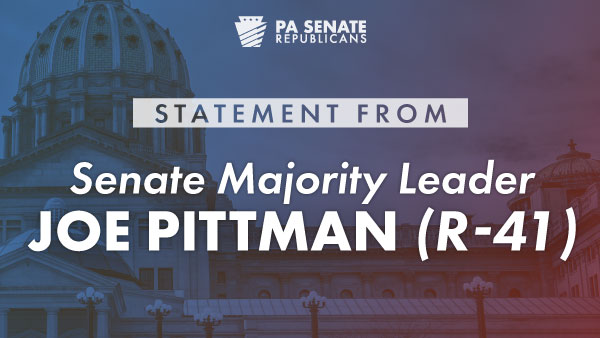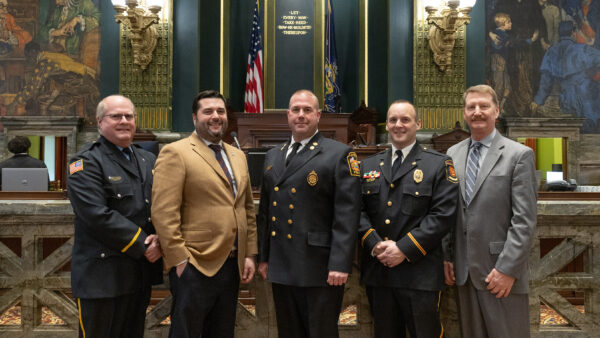HARRISBURG – State Sen. Scott Martin (R-13), chairman of the Senate Appropriations Committee, and State Sen. Gene Yaw (R-23), chairman of the Senate Environmental Resources and Energy Committee, applauded a $50 million annual recurring investment in the state’s Clean Streams Fund included in the 2024-25 state budget.
The landmark Fund addresses agricultural conservation, nutrient management, clean water procurement, stormwater management and acid mine drainage and has helped Pennsylvania gain momentum in meeting its goals for reducing pollution to the Chesapeake Bay. Spearheaded by Martin and Yaw last session, along with Sen. Dan Laughlin (R-49), establishment of the Fund coincided with creation of the Agricultural Conservation Assistance Program (ACAP). This program is designed to share costs to farmers for farm management practices that reduce sediment in waterways, keeping the nutrients out of waterways and on the farm to build soil health.
“Clean water is a key contributor to the health of our communities and the quality of life we enjoy,” Martin said. “We have made tremendous progress in recent years to ensure our water is cleaner and healthier, and I am proud that our state budget makes historic new investments to ensure this progress can continue for many years to come.”
“The Clean Streams Fund puts money into action by correcting decades of non-point source pollution with innovative solutions, like pay-for-performance and strategic tree planting, without demanding a single additional cent from taxpayers,” Yaw said. “Funding of this magnitude will go a long way toward restoring our local Pennsylvania streams and the continued improvement of downstream waters like the Chesapeake Bay. This is a historic investment, and I am grateful for the continued support of my fellow lawmakers and our governor in getting this across the finish line.”
The legislators noted that Pennsylvania boasts the highest stream density in the continental United States, with more than 85,000 miles of waterways that support a $26.9 billion outdoor recreation industry and more than 390,000 jobs. Unfortunately, one-third of those streams fall short of water quality standards for drinking, fishing or swimming.
Best management practices implemented by farmers and local governments are showing results. Earlier this month, the annual report card released by the University of Maryland Center for Environmental Science (UMCES) showed notable progress, with the overall health of the Chesapeake Bay receiving its best grade in more than two decades. The Upper Bay, which is most influenced by the Susquehanna River, received a B- in the report card, a score second only to the lower Bay which is influenced by the Atlantic Ocean.
Over 967 miles of streams have been restored back to health in the past 20 years, and new tools to find the most effective actions and locations, combined with new resources through the Clean Streams Fund, will accelerate that trend.
“As the Chesapeake Bay restoration enters its fifth decade, our non-governmental partners and scientific advisors are emphasizing the need for more strategic efforts that have relevance to local communities across the watershed. Pennsylvania’s Clean Streams Fund is an example of that “local-first” approach that will benefit both Pennsylvania and the Bay,” said Anna Killius, Executive Director of the Chesapeake Bay Commission.
The Chesapeake Bay is the largest and most productive estuary in the United States, spanning six states and the District of Columbia. It is fed by 50 major tributaries, including the Susquehanna River, which is the largest tributary in the Bay. The Susquehanna River contributes about half of the Bay’s fresh water.
Senators Martin and Yaw represent Pennsylvania as members of the Chesapeake Bay Commission, a tri-state legislative commission advising the general assemblies of Pennsylvania, Maryland and Virginia. Yaw chairs the Commission’s Pennsylvania Delegation and is a vice chair of the Commission.
For more state-related news and information, constituents can visit Senator Martin’s website at www.SenatorScottMartinPA.com and Senator Yaw’s website at www.SenatorGeneYaw.com and
CONTACT:
Jason Thompson (Sen. Martin)
717-787-6535
Elizabeth Weitzel (Sen. Yaw)
717-787-3280









